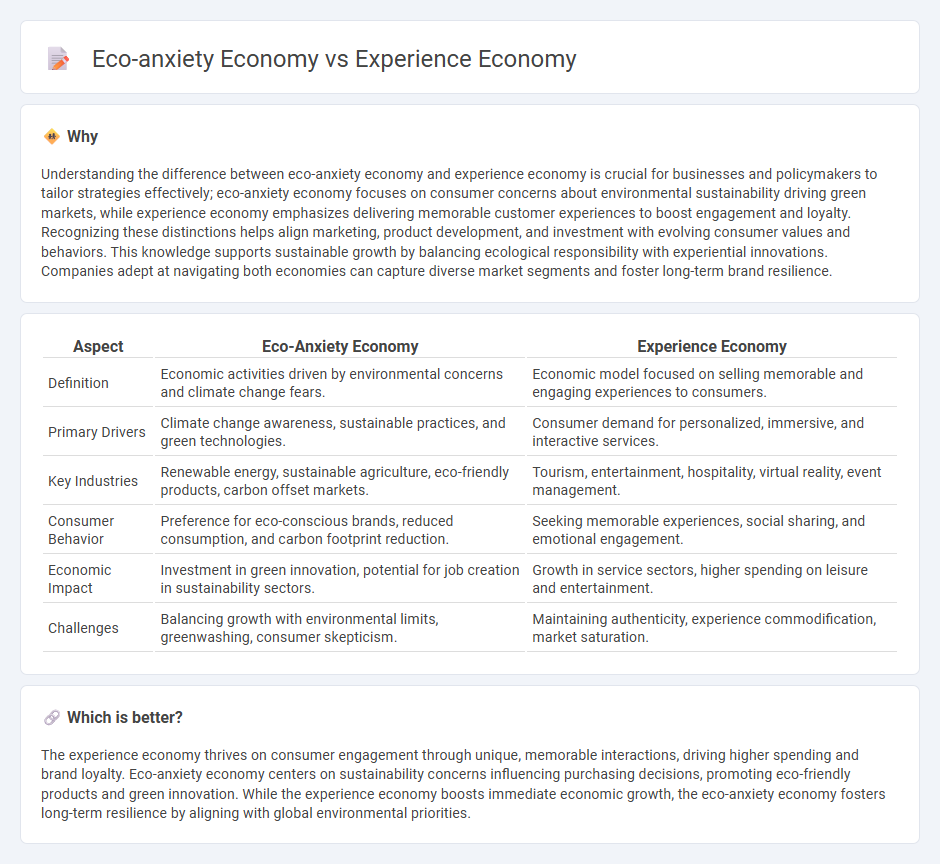
The economy increasingly reflects growing eco-anxiety, shaping consumer behavior and corporate strategies toward sustainability and environmental responsibility. In contrast, the experience economy prioritizes intangible value, focusing on memorable, engaging customer experiences that drive spending beyond mere products. Explore how these economic paradigms influence market trends and consumer choices in today's evolving landscape.
Why it is important
Understanding the difference between eco-anxiety economy and experience economy is crucial for businesses and policymakers to tailor strategies effectively; eco-anxiety economy focuses on consumer concerns about environmental sustainability driving green markets, while experience economy emphasizes delivering memorable customer experiences to boost engagement and loyalty. Recognizing these distinctions helps align marketing, product development, and investment with evolving consumer values and behaviors. This knowledge supports sustainable growth by balancing ecological responsibility with experiential innovations. Companies adept at navigating both economies can capture diverse market segments and foster long-term brand resilience.
Comparison Table
| Aspect | Eco-Anxiety Economy | Experience Economy |
|---|---|---|
| Definition | Economic activities driven by environmental concerns and climate change fears. | Economic model focused on selling memorable and engaging experiences to consumers. |
| Primary Drivers | Climate change awareness, sustainable practices, and green technologies. | Consumer demand for personalized, immersive, and interactive services. |
| Key Industries | Renewable energy, sustainable agriculture, eco-friendly products, carbon offset markets. | Tourism, entertainment, hospitality, virtual reality, event management. |
| Consumer Behavior | Preference for eco-conscious brands, reduced consumption, and carbon footprint reduction. | Seeking memorable experiences, social sharing, and emotional engagement. |
| Economic Impact | Investment in green innovation, potential for job creation in sustainability sectors. | Growth in service sectors, higher spending on leisure and entertainment. |
| Challenges | Balancing growth with environmental limits, greenwashing, consumer skepticism. | Maintaining authenticity, experience commodification, market saturation. |
Which is better?
The experience economy thrives on consumer engagement through unique, memorable interactions, driving higher spending and brand loyalty. Eco-anxiety economy centers on sustainability concerns influencing purchasing decisions, promoting eco-friendly products and green innovation. While the experience economy boosts immediate economic growth, the eco-anxiety economy fosters long-term resilience by aligning with global environmental priorities.
Connection
Eco-anxiety economy drives consumer demand for sustainable products and services, influencing market trends and corporate strategies within the experience economy. The experience economy capitalizes on eco-conscious consumers by offering immersive, eco-friendly experiences that align with their environmental values. This intersection promotes a shift towards sustainable consumption patterns, fostering innovation and resilience in both economic sectors.
Key Terms
**Experience Economy:**
The Experience Economy centers on creating memorable and engaging customer experiences as a key differentiator for businesses, driving economic value through emotional and sensory involvement rather than just products or services. This model emphasizes personalization, immersive events, and interactive environments that foster consumer loyalty and brand advocacy. Explore how the Experience Economy can transform your business strategy and enhance customer connection.
Customer Experience
The experience economy centers on creating memorable and engaging customer interactions that drive loyalty and satisfaction, while the eco-anxiety economy reflects growing consumer concern over environmental impact and sustainability in purchasing decisions. Brands must integrate immersive experiences with transparent eco-friendly practices to address the emotional and ethical drivers shaping modern consumer behavior. Explore how innovative companies balance compelling customer journeys with environmental responsibility to thrive in this evolving market.
Personalization
The experience economy thrives on personalization by tailoring products and services to individual preferences, enhancing customer engagement and satisfaction. In contrast, the eco-anxiety economy personalizes experiences by addressing environmental concerns, offering sustainable options that resonate with eco-conscious consumers. Explore how businesses integrate personalization strategies to balance immersive experiences with environmental responsibility.
Source and External Links
What is the Experience Economy? - Localist - The experience economy is an economy where goods or services are sold by emphasizing their impact on people's lives, focusing on memorable experiences rather than just products or services alone, a term coined in 1998 by the Harvard Business Journal.
Making memories: the rise of the experience economy | Barclays - Spending on experiences has been shown to boost happiness and wellbeing more than purchasing physical items, with the experience economy contributing significantly to the UK economy and expected to grow, especially driven by younger consumers increasingly favoring experiences over goods.
Experience economy - Wikipedia - The experience economy is defined as the sale of memorable experiences to customers, first introduced in 1998 by Pine II and Gilmore, emphasizing that businesses create value by orchestrating memorable events and transformations for consumers beyond goods and services.
 dowidth.com
dowidth.com